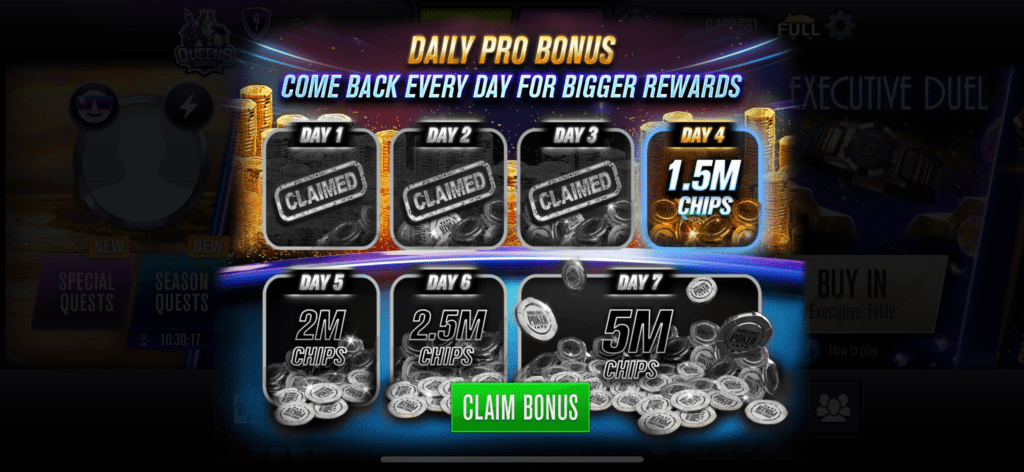This week, I played World Series of Poker (WSOP) by Playtika Holding Corp. I played it as a mobile app, but it seems to have a web version as well. It’s basically just video poker, so it’s a game aimed at adults, though I will note that there was no age check on the app. This is most likely because while there are microtranscations to buy more in game “chips” with which you make bets like in real poker, these chips can’t be extracted from the game for real money, so the game doesn’t need an age gate.
Much of the draw and addictive value of real poker comes form the feeling of winning big and taking huge risks. But, in a version of the game where no real money is changing hands, the creators of WSOP use currency as a tool to amplify addictive designs more common in microtransaction based mobile games.
Primarily, I noticed a stark difference in balance between the game and real life poker. In real poker, the house takes a cut of any winnings. This doesn’t happen in WSOP. Instead, the player who wins the hand takes all of the “chips” bet by other players, so you may lose chips, but your chips stay in circulation with another player. This means that chips enter the economy as people buy chips or gain them through completing in game quests. You But, while other mobile games have some mechanic to spend in game currency and cause them to exit the economy, such as by buying upgrades with gems in Clash of Clans or using your primos to buy wishes in Genshin Impact, WSOP simply doesn’t have a way for currency to exit. By discarding the “spending” mechanic present in nearly every other game with microtransactions, a clever hyper-inflationary dynamic arises.
This creates two main motivators for addiction. First, it makes it so you have to play the game constantly if you want to keep up with your friends. If every day you don’t play, your money is worth less and less, you only lose by not playing. For players who join clubs, add friends, or chat with others, it becomes necessary to continuously build wealth in order not to fall behind. This becomes especially relevant in the club mechanic, where players compete together to play/win the most games and gain rewards for their club. If you’re not continuously playing, you become a liability. And if you have to take a break, then you’d better pay up for more chips. While this is a dynamic that many games try to create, WSOP succeeds when it pegs progress not to collectibles the player gets to keep forever, but to volatile chips that can lose value at any time.

Second, the fact that on net everyone is gaining chips means that each individual feels like a winner while also never truly winning enough. The risk of real poker is that you might simply lose and run out of money. In comparison, by tipping the odds in the player’s favor through adjusting the expected value WSOP ensures no one quits early before they’ve had the chance to build up connections with other players and truly get hooked. At the same time, inflation means that even when you win, you never win enough to feel like you’ve beat the game, so there is a constant sense of daily progression.

But if that isn’t enough, WSOP also utilizes battle passes and seasonal ranking charts to make players feel the need to play every day. What’s unique is that in WSOP, these mechanics are once again tied to your chips earnings and losses. This encourages players to make big bets, meaning that they’re more likely to lose and need to buy chips to keep making big bets to complete their quests. Through randomness, players eventually lose big. But by requiring hand after hand to be played to complete big milestones, the game guarantees that a loss will inevitably occur. By essentially tracking your progress, the game encourages players not to give up. This is in contrast to real poker, in which the casino purposely does not track your progress so you forget how much money you’ve lost.
In summary, WOSP rigs the odds in your favor rather than the houses to keep you coming back day after day.




